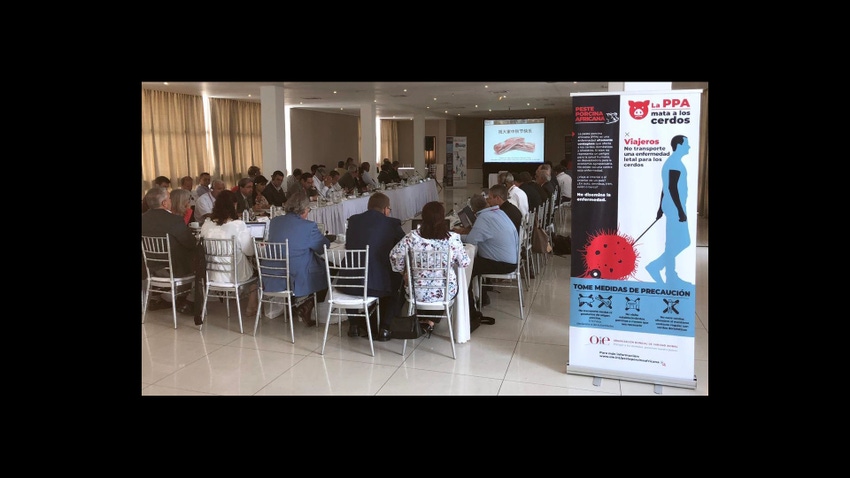High-level veterinary services officials discuss better coordination to prevent entry of African swine fever and create expert group on ASF for Americas.
September 18, 2019

The recent spread of African swine fever (ASF) in Europe and, more recently, in Asia is responsible for huge economic losses within the pig industry, endangering the livelihoods of many smallholder farmers, according to the World Organization for Animal Health (OIE).
Given the gravity of the situation and following the request of member countries at the OIE General Session in May, OIE launched a global initiative for the control of ASF with the objective to control the disease, strengthen countries’ prevention and preparation efforts and minimize the adverse effects on animal health, animal welfare and international trade.
The Americas region is free of the disease, and its ASF-free status must be preserved, OIE said. However, a lack of precautions by professionals, hunters, travelers, farmers or anyone unaware of its transmission pathways could result in the emergence of ASF, the group said.
Preventing the introduction of ASF in the region and, if ever it happens, being prepared to contain its spread and devastating consequences are of the utmost importance, OIE added.
Present at the 10th meeting of the Global Framework for the Progressive Control of Transboundary Animal Diseases (GF-TADs) Steering Committee of the Americas were 15 OIE delegates and senior authorities, alongside regional organizations representing North, Central and South America, including the Regional International Organization for Agricultural Health, the Inter-American Institute for Cooperation on Agriculture, the Pan American Health Organization, the Andean Community of Nations, the Caribbean Community, the Permanent Veterinary Committee of the Southern Cone and the Ibero-American Pork Organization.
In addition to analysis of the regional situation, the discussions led to the creation of a Standing Group of Experts on African Swine Fever (SGE-ASF) for Americas under the umbrella of GF-TADs, using the SGE-ASF created in the European region in 2014 as a model.
OIE said developing measures specific and adaptable to the region is essential to prevent the entry of the disease, thanks to the definition of priority actions oriented to local needs and complementary of the global initiative. Internationally recognized ASF or swine disease experts with experience working in Europe or Asia will be included in the group on an ad hoc basis on agreement of the SGE-ASF.
OIE noted that the presence of pig industry representatives is a good example of how private/public partnerships can reinforce the effectiveness of veterinary service activities and support implementation of a global program for the control and eradication of animal diseases.
All participants agreed that strong collaboration by the regional and international community, as well as good communication, are essential to minimize the effects of ASF.
According to OIE, ASF is caused by a virus affecting pigs of all ages, and its signs can be confused with other diseases. It can be spread through live or dead domesticated or wild pigs and products derived from them. In addition, transmission may occur through contaminated food and other inanimate objects (fomites) such as footwear, clothing, vehicles, knives or equipment, OIE added. The “human factor” is of tremendous importance in the spread of ASF, considering that the virus is resistant in the environment and survives long distances, especially in pig products. There is no vaccine against the disease, so prevention, consequently, is key.
Source: World Organization for Animal Health, which is solely responsible for the information provided and is wholly owned by the source. Informa Business Media and all its subsidiaries are not responsible for any of the content contained in this information asset.
You May Also Like



